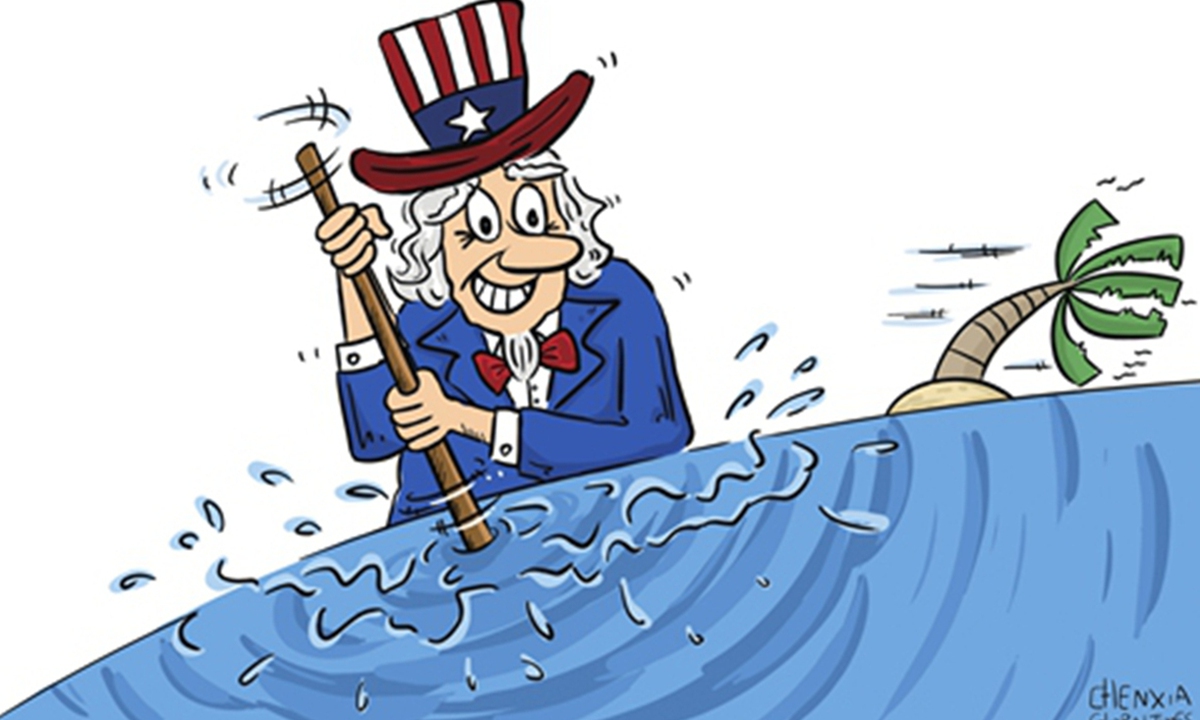ASEAN countries have learned not to choose sides
By Xu Liping Source: Global Times Published: 2020/9/10 23:28:40

Illustration: Chen Xia/GT
The 53rd Association of Southeast Asian Nations (ASEAN) Foreign Ministers' Meeting and related meetings, including the 10th East Asia Summit Foreign Ministers' Meeting, kicked off online on Wednesday, and is schedule to end on Saturday.
Chinese State Councilor and Foreign Minister Wang Yi said, "The US is becoming the biggest driver of militarization in the South China Sea." US Secretary of State Mike Pompeo, however, repeated the old tune that Beijing's "expansive maritime claims" in the South China Sea are unlawful. Ahead of the summit, Pompeo said the Communist Party of China (CPC) is "engaged in a clear and intensifying pattern of bullying its neighbors."
As the US is an external power in the South China Sea, Pompeo's remarks are not appropriate. Furthermore, since Washington has not ratified the United Nations Convention on the Law of the Sea, it is not qualified to play judge the South China Sea issue.
When groundlessly accusing China of "bullying" neighbors, the US blamed the CPC instead of China. Washington's new strategy seems to be to split the Chinese people from the CPC. It has been using the same tactic in its attacks on China over the South China Sea issue. Some Southeast Asian countries have a negative impression of the Communist Party. For example, many Indonesians remain suspicious of the Communist Party as well as its beliefs, and it is still illegal to defend communism in this Southeast Asian country. Pompeo's rhetoric on the CPC caters to such sentiments in the region, so as to exaggerate the threat of the CPC and the corresponding ideology. Blaming the CPC, instead of China, is the US' orchestrated discourse, which deserves China's concern. Washington is attempting to isolate China from other countries by applying such rhetoric.
Reuters reported Indonesian Foreign Minister Retno Marsudi said, "We [Indonesia] don't want to get trapped by this [China-US] rivalry." This echoes the position of almost all Southeast Asia countries. Many diplomats and politicians from ASEAN members have repeatedly expressed neutrality between Beijing and Washington. They are pursuing a policy of a "balance of power," which will secure their national interests to the greatest extent.
This is something they have learned from their past. Some countries had taken sides between great powers. In history, Indonesia has learned that taking sides between great powers is not the best scenario, and so have other Southeast Asian countries.
Japan, another non-regional power, has meddled in the South China Sea issue as well. Kyodo News quoted Japanese Foreign Minister Toshimitsu Motegi as saying at the meeting that he shared his serious concerns with other members over continuing attempts to unilaterally change the status quo in the South and East China seas. Kyodo News said it was apparently in reference to China's assertiveness in the two disputed bodies of water.
Japan has its own concerns about South China Sea claims. Japan sees the South China Sea as its maritime lifeline. Much of this country's foreign trade needs to be transported through there, making so-called freedom of navigation significant to Japan.
Additionally, as an ally of Washington, Tokyo is supposed to bolster Washington's strategy in the region. Japan may also hope to gain more leverage over the East China Sea by stirring up the South China Sea.
However, Japan will not be all-in with the US, as it might irritate China. Japan is committed to engaging in expansive cooperation with China.
With rising meddling from the US and its allies, whether a military clash will break out in the region has sparked greater debate. The possibility will be low, as a massive conflict is not in line with the interests of either party.
To secure regional peace and stability, ASEAN members should continue to promote negotiations on a code of conduct. They should remain vigilant toward US moves as well. They need to be aware that in case a military clash breaks out in the region, US assistance will be extremely limited.
The author is director of the Center for Southeast Asian Studies of the Chinese Academy of Social Sciences. opinion@globaltimes.com.cn
RELATED ARTICLES:
Posted in: VIEWPOINT